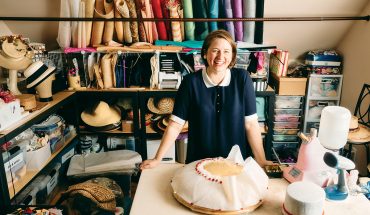Local parent organizes programs for students with autism
by Addie Ladner
All photos courtesy 3 Irish Jewels Farm
Being a parent can be tough. Erin O’Loughlin found being a parent of a school-aged child with autism really tough, with practically no support options for her son Marcus when he wasn’t in class. So she created her own. Her nonprofit, 3 Irish Jewels Farm, provides after-school programs and track-out and summer camps for Wake County children and teens on the autism spectrum.
O’Loughlin founded 3 Irish Jewels Farm in 2012, named for her three children, who she and her Irish husband refer to as their “jewels.” One of those jewels, Marcus, was diagnosed with autism at age 3; and 1 in 58 people are diagnosed with autism in North Carolina, which is higher than the national average. O’Loughlin was struck by that fact, and by the experience of watching her son struggle with a year-round public school schedule that had him in class for nine weeks and then out for three. For kids with autism, this change in schedule and for such a great length of time can be difficult. “Kids with autism and special needs need routine and to know what to expect,” O’Loughlin says. “We want to create options for autistic kids and teens year-round.”
In the past few years, 3 Irish Jewels Farm has served dozens of Wake County students through its two initiatives, Camp Bluebird and Take Flight Club. Camp Bluebird, a track-out and summer camp, allows school-aged kids in kindergarten through eighth grade on the autism spectrum to come and just be kids: They get to participate in those right-of-passage childhood activities like playing tag with friends or making popcorn. Impressively, activities also include the likes of budgeting and creating beautiful works of art to be auctioned off at the organization’s annual Bluebird Ball.
During all of the playing and learning, O’Loughlin and her staff are focused on subtle skill development. For children with autism, seemingly simple abilities such as holding a conversation or waiting in line can be difficult. Those types of basic human interactions are what O’Loughlin, her staff of 3, and her network of volunteers make a top priority. They focus on play, life, and social skills. Keeping the camp size small, with a 1-to-3 camper-to-staff ratio, allows the individual needs of each child to be taken into consideration. Although there’s nearly always a waiting list, O’Loughlin says the personalized experience is what makes camp impactful. It’s important to keep the groups small.
The camp is run much like a traditional autistic classroom, with the right amount of room for flexibility. “We keep it fun and recreational, but extremely structured,” O’Loughlin says, “and we throw in a bit of academics to keep the brain refreshed.” Camp sessions are held in the organization’s “playhouse” in Holly Springs. It’s a space set up to meet the unique and complex needs of a child on the autism spectrum: Several picture-oriented aids show what the day and the month’s schedule holds, and an enclosed sensory area is equipped with a tent, ball pit, and sandboxes where kids can go if they need to wind down.
O’Loughlin and her highly qualified staff know each of the camp-goers’ favorite songs and activities, their language and cognitive skills, how to comfort them and what their individual needs are. Before a child even enters into Camp Bluebird, the family fills out extensive paperwork. Then O’Loughlin goes the extra mile to meet with the teachers and families to learn about any pressing challenges or specifics they can work together on. O’Loughlin’s background is in marketing and fundraising, but it’s clear helping kids and teens with autism live a more meaningful life has become her calling. “I’ve become an expert,” she says.
O’Loughlin has noticed that the camps, while immensely benefitting the children, also provide respite for their parents and caregivers. “We’ve had several kids come here that couldn’t stay at other camps. We’ve had parents tell us this was the first time they had been out in public with their child.”
The organization receives frequent feedback from parents and teachers that Camp Bluebird eases the transition back to school from break, O’Loughlin says. Andrea Rasmussen, a camp staff member and the organization’s director of programs, used to work with autistic and special needs students for the Wake County Public School System. Rasmussen says she often had parents inquire about outside resources, but didn’t have much to give them. “Now I can. There’s really nothing like this in the area right now,” she says. “I found out what Erin was doing and I knew I wanted to be a part of that.”
Kara Meyer found it difficult locating somewhere to fit her teenage son Julian’s needs. “It can be a challenge to find a place that can cope with his challenges,” Meyer says. She told O’Loughlin of her concerns and says O’Loughlin responded with, “We’ll take him. He’ll be fine.”
“I just broke down,” Meyer says.
The 3 Irish Jewels Farm work doesn’t only happen during school breaks. The organization’s other initiative, the after-school Take Flight Club, offers students like Julian time to participate in simple, normal, and, most importantly, fun activities. He walks a trail with a friend after school, makes cookies, and watches movies. He can be a teenager. He can build friendships and feel part of a safe and loving community. Meyer quickly noticed a boost in confidence after Julian went to his first club session. “Whatever they’re doing, they are doing really well. He came home glowing on that first night.”
Alongside regular programming, O’Loughlin and Rasmussen have prioritized community engagement with their students. In February, the nonprofit reached a milestone by facilitating its first successful community service project for Valentine’s Day. Residents at Windsor Point Retirement Community received Pinterest-worthy cookie mixes made by the teens, who also hand-delivered them with fresh flowers. “Individuals with autism, with appropriate support, are able to do so much,” Rasmussen says .
So far, 3 Irish Jewels Farm is just beginning, O’Loughlin says. Children and teenagers with autism grow into adults who will continue to need support. “People don’t stop having autism. It affects them their entire life. They end up with an autism diagnosis and continue to age, but services for them don’t continue,” O’Loughlin says. Her big vision for the organization is to bring to life what would be Wake County’s first agricultural autistic community, a 20-30 acre farm where autistic teens and adults can work, thrive, and live.
This mission is why the organization is named 3 Irish Jewels Farm, and O’Loughlin says the vision is coming together, hopefully quite soon. She wants to see all of the children she and her team have impacted flourish into adulthood and live a meaningful life, and she’s well on her way.





